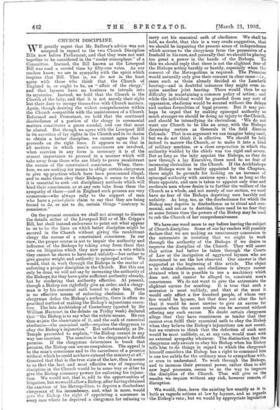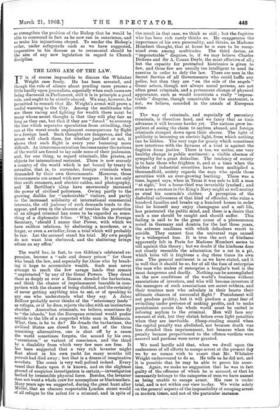CHURCH DISCIPLINE.
WE greatly regret that Mr. Balfour's advice was not accepted in regard to the two Church Discipline Bills now before Parliament, and that they were not sent together to be considered in the "cooler atmosphere" of a Committee. Instead, the Bill known as the Liverpool Bill was read a second time by fifty-one votes. As our readers know, we are in sympathy with the spirit which inspires that Bill. That is, we do not in the least agree with those who think that the Church of England is, or ought to be, an " affair of the clergy," and that laymen have no business to intrude into its mysteries. Instead, we hold that the Church is the Church of the laity, and that it is not merely their right but their duty to occupy themselves with Church matters. Again, though desiring the widest comprehension within the Church compatible with the maintenance of a Church Reformed and Protestant, we hold that the continued disobedience of a portion of the clergy in ceremonial matters constitutes a grave scandal, and one that must be abated. But though we agree with the Liverpool Bill in its assertion of lay rights in the Church and in its desire to obtain a better discipline, we cannot agree that it proceeds on the right lines. It appears to us that in all matters in which men's consciences are involved, when coercion in any form is necessary it is of the utmost importance to proceed in a manner which will take away from those who are likely to prove recalcitrant the excuse of the constrained conscience. When, there- fore, we are seeking for means to oblige certain clergymen to give up practices which have been pronounced illegal, and to make them obey their Bishops, it seems to us that it is essential to seek out disciplinary methods which will bind their consciences, or at any rate take from them the sympathy of those—and in England such persons are very numerous—who always rally to the support of men who have a prinici-facie claim to say that they are being forced to do, or not to do, certain things "contrary to conscience."
On the present occasion we shall not attempt to discuss the details either of the Liverpool Bill or of Mr. Cripps's Bill, but shall instead endeavour to point out what appear to us to be the lines on which better discipline might be secured in the Church without giving the recalcitrant clergy the excuse of a constrained conscience. In our view, the proper course is not to impair the authority and influence of the Bishops by taking away from them that veto on litigation which they now possess—a veto which they cannot be shown to have used unfairly—but rather to give greater weight and authority to episcopal action. We would, that is, work through the Bishops in the matter of enforcing a proper discipline in the Church. But this can only be done, we will not say by increasing the authority of the Bishops, for they have quite sufficient authority already, but by rendering that authority effective. At present, though a Bishop can rightfully give an order, and a clergy- man is by his canonical oath bound to obey him, there is no effective means of enforcing obedience. If the clergyman defies the Bishop's authority, there is often no practical method of making the Bishop's injunctions execu- tive. The late Archbishop of Canterbury (quoted by Sir William Harcourt in the debate on Friday week) declared that " the Bishop is to say what the rubric means. He can then enjoin the observance of it, and the oath of canonical obedience—the canonical oath—requires the clergyman to obey the Bishop's injunction." But unfortunately, as Dr. Temple proceeded to explain, " the Bishop cannot in any way use coercion. The sanction is the clergyman's double promise. If the clergyman determines to break that promise, the Bishop can use no compulsion. The appeal is to the man's conscience and to the sacredness of a promise without which he could not have entered the ministry at all." Granted that that is the true state of the law, then it seems to us that the best and most effective way of improving discipline in the Church would be in some way or other to give the Bishop summary powers for enforcing his injunc- tion. We would not, that is, add to the opportunities of litigation, but we would allow a Bishop, after having obtained the sanction of his Metropolitan, to deprive a disobedient clergyman of his incumbency, and, what is more, would give the Bishop the right of appointing a successor in every case where he deprived a clergyman for refusing to carry out his canonical oath of obedience. We shall be told, no doubt, that this is a very crude suggestion, that we should be impairing the present sense of independence which accrues to the clergyman from the possession of a freehold in his cure, and generally that we should,be placing too great a power in the hands of the Bishops. To this we should reply that there is not the slightest fear of the Bishops acting harshly or hastily, especially when the consent of the Metropolitan is required. The Primates would naturally only give their consent in clear cases—i.e., cases such as those already decided at the Lambeth hearing—and in doubtful instances they might even re- quire another joint hearing. There would thus be no difficulty in maintaining a common policy of action ; and while the individual would be guarded. from any sort of oppression, obedience would be secured without the delays and useless formalities of legal process. But it may per- haps be urged that by making episcopal authority so much stronger we should be doing an injury to the Church, and should be intensifying its clericalism. 'We do not want our Church to be like an army, with the Bishops dismissing rectors as Generals in the field dismiss Colonels. That is an argument we can imagine being used, but we do not think it is effective. We should be loth indeed to narrow the Church, or to make it into a kind of military machine, or a close corporation in which the authority wielded by the chiefs was too rigid and severe. But as long as the laity appoint the Bishops, as they do now through a lay Executive, there need be no fear of increasing clericalism in the Church. If the Archbishops and Bishops were in reality appointed by the Chapters, there might be grounds for looking on an increase of episcopal authority with anxious eyes ; but as long as the State appoints, and care is taken to appoint only wise and moderate men whose desire is to further the welfare of the Church as a whole, and not merely of one section, we heed have no fear of the Bishops depriving men harshly and unfairly. As long, too, as the disobedience for which the Bishop may deprive is disobedience as to ritual and cere- monial, and not as to doctrine, there need be no fear that at some future time the powers of the Bishop may be used to rob the Church of her comprehensiveness.
We have one word more to say before leaving the subject of Church discipline. Some of our lay readers will possibly declare that we are making an unnecessary concession to the extremists in insisting that we ought to work through the authority of the Bishops if we desire to improve the discipline of the Church. They will assert that action had better be taken through the Courts of Law at the instigation of aggrieved laymen who are determined to see the law observed. Our answer is that suggested at the beginning of this article. The object is to obtain obedience, and obedience is always easiest obtained when it is possible to use a machinery which does not, and cannot be alleged to, constrain men's consciences. We do not want to give the extremists the slightest excuse for seceding. It is true that such a secession is most unlikely, and that at the most it would only affect a 'few hundred people, of whom very few would be laymen, but that does not alter the fact that it would be most unwise to give an excuse for secession when the same results can be secured without offering any such excuse. No doubt certain clergymen allege that they have consciences so tender that they cannot even fulfil their canonical oath to obey the Bishop when they believe the Bishop's injunctions are not sound, but we venture to think that the defection of such men would be most unlikely, or, at any rate, would meet with no external sympathy whatever. The distinction that the clergyman only swears to obey his Bishop when his Bishop tells him to do things in regard to which the clergyman himself considers the Bishop has a right to command him is one too subtle for the ordinary man to sympathise with, or even to understand. To work through the Bishops, and to increase their personal power, rather than to add new legal processes, seems to us the way to improve the discipline of the Church. That will give us the results we require without any risk, however remote, of disruption.
We would, then, leave the existing law exactly as it is, both as regards actions at law by laymen, and as regards the Bishop's veto ; but we would by appropriate legislation so-strengthen the position of the Bishop that he would be able to command in fact as he now can in conscience, and so make his injunctions obeyed. To render the Bishop's order, under safeguards such as we have suggested, imperative in his diocese as to ceremonial should be the aim of any new legislation in regard to Church discipline.











































 Previous page
Previous page